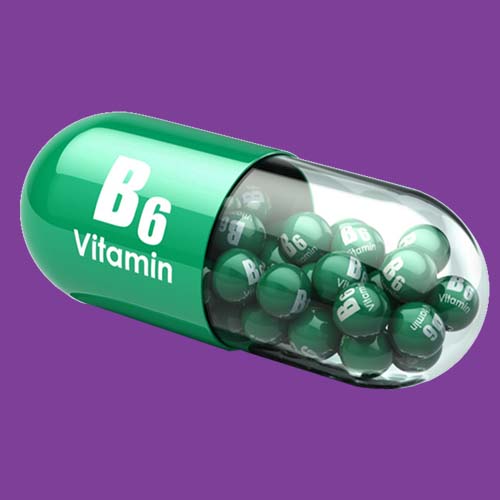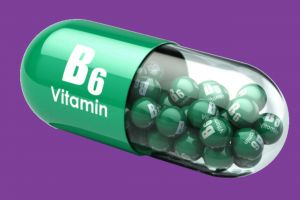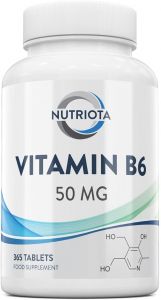Vitamin B6
B vitamins include vitamin B6. Vitamin B6 comes in three forms: pyridoxine, pyridoxal, and pyridoxamine. It can be found in certain foods and is also manufactured in a laboratory.

Vitamin B6
B vitamins include vitamin B6. Vitamin B6 comes in three forms: pyridoxine, pyridoxal, and pyridoxamine. It can be found in certain foods and is also manufactured in a laboratory.
Overview
B vitamins include vitamin B6. Vitamin B6 comes in three forms: pyridoxine, pyridoxal, and pyridoxamine. It can be found in certain foods and is also manufactured in a laboratory.
Vitamin B6 is required for the proper functioning of the body’s sugars, fats, and proteins. It is also required for the development of the brain, nerves, skin, and many other body parts. It can be found in cereals, legumes, and eggs, and it is frequently combined with other B vitamins in vitamin B complex products.
Vitamin B6 is commonly used to prevent and treat vitamin B6 deficiency. It is also used to treat heart disease, premenstrual syndrome (PMS), depression, morning sickness, Alzheimer’s disease, menstrual cramps, diabetes, and a variety of other conditions, but there is little scientific evidence to back up many of these claims.
Source
Vitamin B6 can be found in a wide range of animal and plant foods.
-
Beef liver
-
Tuna
-
Salmon
-
Fortified cereals
-
Chickpeas
-
Oats
-
Soya beans
-
Peanuts
-
Pork
-
Poultry, such as chicken or turkey
-
Some vegetables and fruits, especially dark leafy greens, bananas, papayas, oranges, and cantaloupe
Uses & effectiveness
-
In a Norwegian study, the results of two randomised double-blind controlled trials with a total of 6,261 participants followed for more than three years were combined. Participants were given a B-vitamin complex containing folic acid, B12, and B6, folic acid and B12, 40 mg B6 alone, or a placebo. There were no differences in cardiac events or deaths between the vitamin B6 groups and the placebo group.
-
A Cochrane review was conducted using randomised controlled trials to examine the effects of homocysteine-lowering interventions (B6, B12, and folic acid supplements alone or in combination) on the prevention of cardiovascular events (stroke, heart attack). The follow-up period lasted at least a year. The review found no difference in heart attacks or deaths between the B supplements and placebo; however, it did find a small association with fewer strokes when the supplements were given alone or in combination, compared to placebo.
Cognitive function
Vitamin B6 may help with brain function indirectly by lowering homocysteine levels, as high levels of this protein in the body have been linked to an increased risk of dementia, Alzheimer’s disease, and cognitive decline. There is, however, a lack of controlled trials demonstrating that supplementation can slow cognitive decline.
A Cochrane review examined 14 randomised controlled trials that assessed the cognitive effects of B vitamin supplements on people who used them for at least three months. [6] The supplements (B6 alone or in combination with B12 and folic acid) had no effect on cognition in older adults (60+ years) without dementia at baseline, when compared to a placebo.
Cancer
A systematic review of epidemiological and clinical studies looked at the relationship between vitamin B6 intake or blood levels and all cancers. According to the epidemiological studies, a high intake of vitamin B6 foods and higher B6 blood levels were significantly associated with a lower risk of all cancers, particularly gastrointestinal cancers. However, when total B6 intake from food and supplements was taken into account, the protective effect was diminished. Clinical studies found no protective effect of B6 supplements, but the quality of these studies was rated low because B6 was not given alone and cancer was not the primary outcome studied. Because of the disparity between the results of epidemiological and intervention studies, the authors concluded that vitamin B6 has an ambiguous role in cancer prevention. They hypothesised that higher levels of B6 in the body could reflect the status of other cancer-fighting nutrients.
Vitamin B6 is thought to play a role in colorectal cancer due to its enzyme activity, which may reduce oxidative stress and tumour cell spread. Vitamin B6 deficiency has been linked to chronic inflammation, which is a risk factor for colorectal cancer.
- A meta-analysis of epidemiological studies found no evidence that B6 supplements reduced the risk of colorectal cancer. [8] When pyridoxal 5′ phosphate (PLP) blood levels were measured, participants with higher PLP had a 30-50 percent lower risk of cancer. In these studies, the authors identified potential confounding factors such as healthy lifestyle behaviours (higher level of exercise, no smoking, higher intakes of other vitamins) that may have protected against colorectal cancer.
- Higher PLP blood levels and B6 intake (from food and supplements) were found to have a protective effect on colorectal cancer risk in two prospective studies of men and women from the Physicians’ Health Study and Nurses’ Health Study cohorts. After adjusting for folate, multivitamin, and methionine intakes, this result remained (nutrients that may be protective against colorectal cancer).
Morning sickness
Vitamin B6 has long been used to treat pregnancy-related nausea and its most severe form, hyperemesis gravidarum, which can lead to hospitalisation due to severe dehydration. Taking vitamin B6 orally alleviates mild to moderate nausea and vomiting during pregnancy. Vitamin B6 combined with the drug doxylamine is recommended for those who do not improve when taking vitamin B6 alone.
- A randomised controlled trial of 77 pregnant women found that taking 40 mg of vitamin B6 twice daily reduced the severity of mild to moderate nausea when compared to a placebo.
- A meta-analysis of randomised controlled trials found that vitamin B6 supplements (up to 10 mg daily) were associated with reduced symptoms of mild pregnancy-related nausea when compared to a placebo. A combination of vitamin B6 and doxylamine (an antihistamine) taken preventively before symptoms began was more effective than taking it after symptoms began for moderate to severe nausea.
- The American College of Obstetricians and Gynecologists recommends over-the-counter vitamin B6 and B6 with doxylamine as safe and effective first-line treatments for pregnancy-related nausea.
A rare seizure disorder
A rare seizure disorder that necessitates the use of vitamin B6. Giving vitamin B6 to infants via IV reduces seizures caused by pyridoxine-dependent epilepsy. Only a healthcare provider can administer IV products.
Sideroblastic anaemia
A disorder in which the body produces abnormal red blood cells that accumulate iron (sideroblastic anaemia). The oral administration of vitamin B6 is effective in the treatment of sideroblastic anaemia, an inherited type of anaemia.
Vitamin B6 deficiency
Taking vitamin B6 orally is an effective way to prevent and treat vitamin B6 deficiency.
Hyperhomocysteinemia
Homocysteine levels in the blood are elevated (hyperhomocysteinemia). Taking vitamin B6 orally, usually in conjunction with folic acid, is effective in treating high homocysteine levels in the blood.
Possibly Beneficial for:
- Stones in the kidney. In people with an inherited condition that causes kidney stones, taking vitamin B6 by mouth, alone or in combination with magnesium, can reduce the risk of kidney stones.
- Memory and thinking skills deteriorate as we get older. Taking vitamin B6 orally has no effect on mental function in the elderly.
- Alzheimer’s disease. Taking vitamin B6 supplements or eating a lot of vitamin B6 in your diet doesn’t seem to lower your risk of Alzheimer’s disease.
- Carpal tunnel syndrome is a condition in which the tendons in the wrist become Taking vitamin B6 orally does not appear to alleviate symptoms of carpal tunnel syndrome.
- Cataracts. Taking vitamin B6 orally along with folic acid and vitamin B12 does not prevent cataracts. It may even increase the likelihood of needing cataract surgery.
- Skin reactions. An unfavourable skin reaction as a result of cancer drug treatment (chemotherapy-induced acral erythema). Taking vitamin B6 orally does not appear to prevent this skin reaction in cancer patients. Vitamin B6 may also impair the effectiveness of certain cancer drugs.
- Noncancerous tumours of the large intestine and rectum (colorectal adenoma). Taking folic acid, vitamin B6, and vitamin B12 orally does not reduce the risk of developing colorectal polyps.
- Seizures in pre-eclamptic women (eclampsia). Taking vitamin B6 orally or as a shot does not appear to lower the risk of seizures during pregnancy. Only a healthcare provider can administer vitamin B6 shots.
- Bones that are weak and brittle (osteoporosis). Taking folic acid, vitamin B6, and vitamin B12 orally does not prevent broken bones in people with osteoporosis.
- High blood pressure and protein in the urine are symptoms of a pregnancy complication (pre-eclampsia). Taking vitamin B6 orally or as a shot does not appear to lower the risk of pre-eclampsia. Only a healthcare provider can administer vitamin B6 shots.
- Premature birth. Taking vitamin B6 orally or as a shot does not appear to reduce the risk of premature birth. Only a healthcare provider can administer vitamin B6 shots.
There is some interest in using vitamin B6 for a variety of other purposes, but there isn’t enough reliable data to say whether it will be beneficial.
Side Effects
When taken orally: When used correctly, vitamin B6 is most likely safe. Vitamin B6 in doses of 100 mg or less per day is generally regarded as safe. When taken in doses of 101-200 mg daily, vitamin B6 may be considered safe. Vitamin B6 may cause nausea, stomach pain, loss of appetite, headache, and other side effects in some people. When taken in doses of 500 mg or more per day, vitamin B6 may be hazardous. High vitamin B6 doses, particularly those of 1000 mg or more per day, may cause brain and nerve problems.
If you get any side effects, talk to your doctor, pharmacist or nurse. This includes any possible side effects not listed on this page. In the UK you can also report side effects directly to the Yellow Card Scheme By reporting side effects you can help provide vital information on the safety of this medical supplement.
Is this medicine suitable for you?
Take precautions:
- Pregnant. When taken as directed, vitamin B6 is most likely safe. It is sometimes used to treat morning sickness, but only under the supervision of a healthcare provider. Taking high doses may be hazardous. Seizures in newborns may occur if the dose is too high.
- breastfeeding. When taken in daily doses of 2 mg, vitamin B6 is most likely safe. Higher amounts should be avoided. There isn’t enough reliable information to know whether taking higher doses of vitamin B6 while breastfeeding is safe.
- Post-surgical stent placement. After receiving a coronary stent, avoid using a combination of vitamin B6, folate, and vitamin B12. This combination may raise the likelihood of blood vessel narrowing.
- Weight loss surgery. Women who have gone through menopause should limit their intake of vitamin A to no more than 1.5mg per day from food and supplements.
- Osteoporosis. People who have had weight loss surgery do not need to take a vitamin B6 supplement. If you take too much, you may experience side effects such as nausea, vomiting, and browning of your skin.
Consult your doctor
Before taking pyridoxine:
Before you begin taking pyridoxine, it is critical that your doctor or pharmacist is aware of the following information:
- If you are pregnant or nursing. This is because, while pregnant or breastfeeding, you should only take medicines on the advice of a doctor.
- If you are currently taking any other medications. This includes any non-prescription medications you are taking, as well as herbal and complementary medicines.
Dosage




